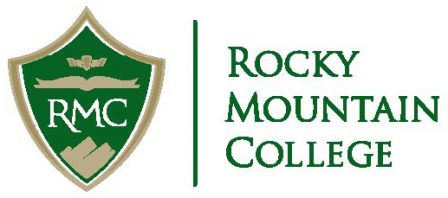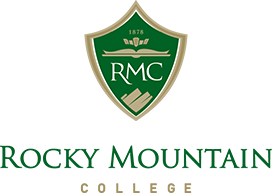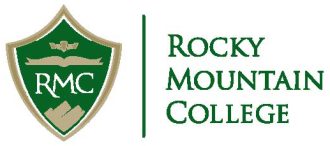Physics Minor
February 3, 2022 2024-01-18 14:55The concepts and principles of physics form the foundation on which all other sciences are built. Developments in the field of physics have also influenced thinking in philosophy, politics, and art, among other areas.
Physics courses at Rocky Mountain College cover the major ideas of both classical and modern physics. Students can gain the understanding required for majors in other sciences, including biology, chemistry, environmental science, and geology. Physics courses are also necessary for students planning careers ranging from aviation and engineering to the health sciences. Other physics courses provide an option for non-science majors to satisfy core curriculum requirements while learning to better appreciate the physical universe around them and also to be better-informed members of a technologically complex society living on an environmentally challenged planet.
Physics courses provide students the opportunity to learn and practice rigorous, quantitative, and mathematical analyses as well as careful and precise verbal discussions. Courses are offered on a wide range of mathematical levels. Some levels require a proficiency in calculus; other levels require little mathematics, but all levels expect students to have, or develop, some ability at quantitative thinking.
Minor in Physics
A minimum of 18 semester hours is required, including:
PHS 201: General Physics I
PHS 202: General Physics III
PHS 300: Physics Lab Projects
Of these 18 semester hours, at least six must be upper division.
PHS 101 – Fundamental Physics I
Semester: Fall; Alternate years
Semester hours: 4
Students examine a survey of the laws and phenomena of classical physics, including motion, force, energy, momentum, waves, and thermodynamics. This course is suitable for non-science majors who have a strong background in high school algebra and who wish to have a more rigorous understanding of physics than provided in most courses for non-science majors. The course will satisfy the requirements of geology and biology majors. Students considering graduate work in these areas should take PHS 201 and PHS 202 instead. Three lecture periods and one two-hour laboratory per week.
PHS 102 – Fundamental Physics II
Semester: Spring; Alternate years
Semester hours: 4
Students examine a survey of the laws and phenomena of classical and modern physics, including light, electricity, magnetism, and atomic and nuclear physics. This course is suitable for non-science majors who have a strong background in high school algebra and who wish to have a more rigorous understanding of physics than provided in most courses for non-science majors. This course will satisfy the requirements of geology and biology majors. Students considering graduate work in these areas should take PHS 201 and PHS 202 instead. Three lecture periods and one two-hour laboratory per week.
Prerequisite: PHS 101
PHS 105 – Principles of Physics
Semester: Offered at discretion of department
Semester hours: 4
A survey of the laws and phenomena of classical physics, including motion, force, energy, momentum, waves, thermodynamics, and their application to aviation topics such as weight and balance, aerodynamics, aircraft maneuvering, g forces, braking, acceleration, and propellors. This course is algebra-based and is intended for aviation majors. Other admitted with permission of instructor when space allows. Course includes a laboratory.
Prerequisite: proficiency in high school algebra and trigonometry or MAT 110 or MAT 131
PHS 201 – General Physics I
Semester: Fall
Semester hours: 4
This course is a calculus-based introduction to the laws and phenomena of classical physics, including force and motion, energy and momentum, their conservation laws, and their oscillations. This sequence is required for chemistry majors and engineering students and is recommended for mathematics, biology, and geology students. Three lecture periods and one two-hour laboratory per week.
Corequesite: MAT 175
PHS 202 – General Physics II
Semester: Spring
Semester hours: 4
This course is a calculus-based introduction to the laws and phenomena of classical physics, including mechanics, waves, light, electricity, and magnetism. This sequence is required for chemistry majors and engineering students and is recommended for mathematics, biology, and geology students. Three lecture periods and one two-hour laboratory per week.
Prerequisite: PHS 201
Corequesite: MAT 176
PHS 225 – Modern Physics
Semester: Fall; Odd years
Semester hours: 3
This course covers selected concepts from early 20th century physics. Topics covered include special relativity, photoelectric effect, Compton scattering, and the wave nature of particles.
Prerequisite: PHS 202 or permission from the instructor
PHS 299 – Independent Study
Semester: Offered at discretion of department
Semester hours: 1-3
This course allows a superior student to devise and pursue independent study in an area agreed upon in consultation with, and supervised by, a faculty member. Students should be either a major or minor and have a cumulative GPA of 3.00 or greater.
PHS 300 – Physics Lab Projects
Semester: Offered at discretion of department
Semester hours: 1-2
This course builds on students’ experience in introductory labs with more complex and sophisticated experiments selected by students in consultation with the instructor. Emphasis will be on experimental design, analysis, and presentation of results. The course will be available every semester on a directed independent study basis. Students may work alone or in teams of two or three students.
Prerequisite: permission of professor
PHS 320 – Relativity Theory
Semester: Fall; Alternate years
Semester hours: 2
Students are introduced to Einstein’s theory of relativity with emphasis on the special theory.
Prerequisite: PHS 201
PHS 321 – Quantum Theory
Semester: Spring; Alternate years
Semester hours: 3
Students are introduced to quantum mechanics, including the historical evolution of the theory. Emphasis will be on the wave mechanical formulation of the theory and Schrödinger’s equation. Topics such as quantum tunneling and atoms will be analyzed. The impact of quantum theory on the scientific worldview will be considered.
Prerequisite: PHS 202 and PHS 225
PHS 343 – Classical and Modern Optics
Semester: Spring; Odd years
Semester hours: 3
This course covers concepts in geometrical and modern optics. Topics covered include reflection, refraction, dispersion, image formation, diffraction, superposition, interference, and polarization.
Prerequisite: PHS 202 or permission from the instructor
PHS 347 – Introduction to Health Physics
Semester: Fall; Even years
Semester hours: 3
This course is an introduction to radiation physics and the biological effects of radiation exposure. Topics covered include atomic and nuclear structure, radioactivity, interaction of radiation with matter, radiation dosimetry, and the biological effects of radiation.
Prerequisite: PHS 202 or permission from the instructor
PHS 499 – Independent Study
Semester: Offered at discretion of department
Semester hours: 1-3
This course allows a superior student to devise and pursue independent study in an area agreed upon in consultation with, and supervised by, a faculty member. Students should be either a major or minor and have a cumulative GPA of 3.00 or greater.
Prerequisite: junior or senior standing
- Toby Anderson, Professor
Contact
Rocky Mountain College
1511 Poly Drive
Billings, MT 59102


